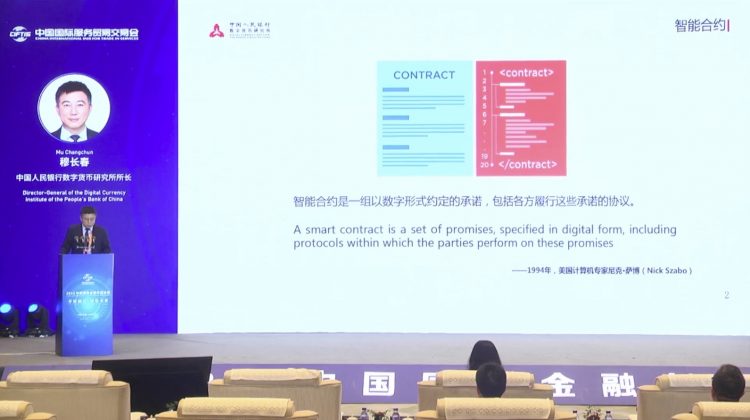The People’s Bank of China (PBOC), the nation’s central bank, plans to deploy more smart contracts for the digital yuan as an increasing number of use cases have emerged amid testing of the new digital currency.
Mu Changchun, director-general of the PBOC’s digital currency institute, said in a speech on Friday that smart contracts involving the digital yuan, or e-CNY, are being used in areas such as government subsidies, retail marketing and pre-paid fund management.
The move is in line with the institute’s whitepaper last year that said the e-CNY would obtain programmability from “deploying smart contracts that don’t impair its monetary functions.”
Smart contracts, widely used in blockchain and decentralized settings, are traceable self-performing contracts that enable conditional payments, guaranteed payments and other complex use cases. E-CNY smart contracts could “facilitate business model innovation,” the PBOC said last year.
Mu said that the “guaranteed enforcement” nature of smart contracts means that there needs to be sound management of smart contract templates and systems in place otherwise it could bring risks to economic and financial stability.
“Smart contracts, in this sense, have to go through compliance reviews and tests before they are made into templates and models,” Mu said, adding that the PBOC is working to establish a platform to review and register smart contract models.
The deployment of e-CNY smart contracts could effectively reduce costs for economic activities and could be put to use in various scenarios, according to Mu.
Last month, Bank of China, one of the country’s largest state-owned commercial banks, started to support e-CNY via smart contracts for after-school education programs in Chengdu, the capital city of southwestern China’s Sichuan province, local media reported in August.
Under the initiative, parents could pre-pay for classes with the e-CNY and if the students miss some classes, the tuition would be automatically refunded via the program’s smart contract settings. That could avoid refund problems if an educational institution ever gets its bank accounts frozen due to legal issues.
The PBOC started pilot trials of the e-CNY in Shenzhen in October 2020 and it has since expanded the trials to at least 23 cities and regions.
Chinese tech giants are also embracing digital yuan payments. In June, online retail platform JD.com recorded 400 million yuan (US$60 million) in digital yuan sales at the “618” shopping festival, accounting for about 0.1% of the event’s total sales.
The use of the digital yuan has also been expanded to include a variety of public transport and municipal services, including metro, buses, trains, highway toll gates, taxation and social insurance.
Source by forkast.news


























